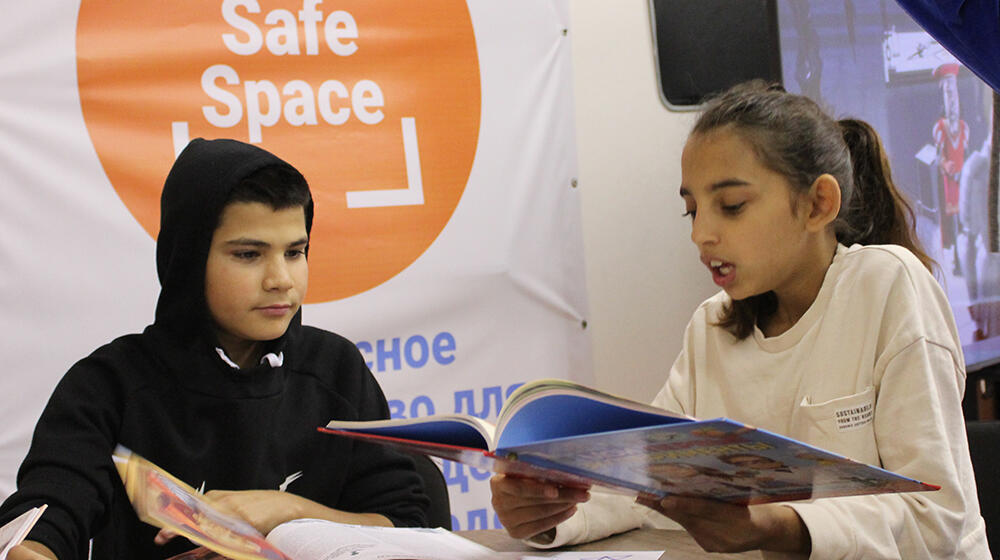“Every day I learn something new here,” says Malina, 12, from Odesa, her eyes shining with emotion and a new-found enthusiasm. Malina is a regular at the UNFPA-supported Youth Safe Space in the Refugee Accommodation Centre in Chișinău, the capital of Moldova. The Safe Space, hosted by the State University of Moldova, and run jointly by UNFPA’s partner Youth Media Centre, is mainly attended by Roma refugees and other minorities, and keeps teens busy with educational and recreational activities.
Malina came to Moldova to escape the war in Ukraine, together with her mother, three siblings and a cousin. “I remember walking in the cold for a very long time, scared from the explosions and tanks that were passing near our house,” she recalls. “We were terrified, but now when I tell the story I am not so frightened because I feel safe and I have started a new life with my siblings.”
New beginnings…and new firsts
Indeed, this month Malina did something extraordinary – she entered a school classroom for the very first time. Now, she says, she can’t wait to learn how to read and write as she understands how this will shape her future.
“When I grow up I want to become a lawyer like Uncle Shahin,” says Malina, referring to Shahin Rădiță, the Safe Space Coordinator, who is also a human rights lawyer and Roma activist. “I want to think like a lawyer, present different facts and help people,” she continues. “I also hope to learn several languages at school. It will help me achieve my goals.”
Malina is not alone, there are 12 other Roma youth at the refugee centre who have just gone to school for the first time. Shahin encourages them to keep attending by rewarding them with special after-school and weekend activities at the Safe Space. Last weekend he organized a visit to a national museum in Chișinău, for most young people it was again another new experience.
Respecting Roma culture
Despite being Roma himself, Shahin was not immediately trusted by the refugee families that arrived in Moldova. “It was a challenge to connect with them,” he says. “Roma communities from Ukraine and Moldova are different.” Ukrainian Roma are more conservative, he explains, and there are more taboos around what youth can discuss, including menstruation and reproductive health issues. “First and foremost, we respect Roma traditions and values here at the Safe Space,” he continues. “Our focus is to equip teens with life skills and ensure they have access to the information and services they need to stay healthy and keep safe.”
The programme at the Safe Space includes sessions on reproductive health, menstrual hygiene and good mental health. The space also provides information and counselling on gender-based violence and human trafficking, making referrals to support services as needed, and connects young people with youth centres and youth-friendly health clinics. Roma youth are also provided with basic hygiene items including menstrual pads, soap, detergent powder, and a toothbrush and toothpaste.
Being treated as equals
The upheaval caused by the war in Ukraine has left its mark on young people’s mental health and Roma youth are no exception. Already marginalized and at higher risks of violence, human trafficking and discrimination, they have been left feeling more disconnected and excluded from society than ever.
Shahin says ensuring Roma youth have access to psychosocial support and counselling to deal with the trauma of the conflict is essential. Many have left fathers behind, and some are now living with a family member suffering from depression. “Sometimes getting a teen out of the room, which is occupied by five or eight relatives, and finding a place for them at our Safe Space is already a healing experience,” he explains.
Malina and her siblings are used to coming to the Safe Space after school to complete their homework. They know that Shahin will challenge them and push them to do their best. He says he can immediately sense when one of them is having a bad day or feeling out of sorts, and encourages them to speak with him or the Safe Space psychologist. There are also special group sessions on resilience, friendship and connection and team building.
“Teens enjoy a challenge and are naturally curious. All they need is support and encouragement,” says Shahin. “And like everyone else they want to fit in.” Malina agrees, but like many refugees in Moldova she also wants to go home; to go back to Ukraine, and be with her family… and she vehemently adds, continue with her education.
***
There are more than 16 static and four mobile Safe Spaces for women, youth and older persons across the Republic of Moldova, established by the United Nations Population Fund (UNFPA) in partnership with NGOs and local organizations as part of the Humanitarian Response in the Republic of Moldova.


